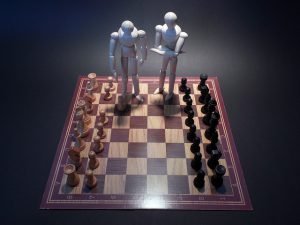
What is Inductive and Deductive Reasoning: Unveiling the Mystery
April 22, 2022
Inductive and deductive reasoning are two fundamental methods of logical thinking that shape our understanding of the world. They form the bedrock of scientific inquiry, mathematical proofs, and everyday decision-making. But what exactly are these two modes of reasoning, and how do they differ? Let’s delve into the intricacies of inductive and deductive reasoning to unravel the mystery.
As Plato once suggested, the beginning is the most crucial part of the work. In this spirit, we embark on a journey through the realms of reasoning, guided by the wisdom of giants like Voltaire, who reminded us that “Doubt is not a pleasant condition, but certainty is absurd.” This sentiment echoes the essence of inductive reasoning, which thrives on probability and openness to new evidence. Montaigne’s advocacy for measuring the credibility of sources enhances our understanding of deductive reasoning’s reliance on sound premises. Herman Hesse’s insights into the human spirit’s complexity underscore the nuanced interplay between these reasoning forms, inviting us to explore beneath the surface of logical structures and into the depths of understanding. As we peel back the layers of how we think, we discover the how and why behind our logical endeavours.
Inductive Reasoning: From Specific to General
Inductive reasoning is a bottom-up approach that moves from specific observations to broad generalizations. Drawing conclusions based on observed data patterns, trends, or regularities involves drawing conclusions. The process begins with collecting empirical evidence through observation or experimentation. By scrutinizing this information, inductive thinkers aim to identify common threads and formulate hypotheses that can explain the phenomena at hand.
One of the most famous examples of inductive reasoning is Archimedes’ discovery of the principle of water displacement. He identified a consistent pattern by observing the rise in water level as objects were submerged. From these specific instances, Archimedes generalized a broader principle: a submerged object displaces an amount of fluid equal to its volume. This groundbreaking insight, derived from inductive reasoning, laid the foundation for fluid dynamics.
Inductive reasoning is not limited to scientific discovery; it permeates our daily lives. When we observe that a particular restaurant consistently serves delicious food, we may inductively infer that future visits will yield similarly pleasant experiences. Inductive reasoning allows us to make predictions and decisions based on historical patterns, even if we cannot guarantee their absolute certainty.
However, the renowned psychologist B.F. Skinner cautioned against the pitfalls of inductive reasoning, stating, “The major difference between a thing that might go wrong and a thing that cannot possibly go wrong is that when a thing that cannot possibly go wrong goes wrong, it usually turns out to be impossible to get at or repair.” Inductive conclusions, while helpful, are inherently probabilistic and subject to revision in light of new evidence.
Deductive Reasoning: From General to Specific
In contrast to inductive reasoning, deductive reasoning follows a top-down approach, moving from general principles to specific conclusions. It involves applying established rules, hypotheses, or theories to particular instances to arrive at logically necessary outcomes. Deductive reasoning is the backbone of mathematical proofs, philosophical arguments, and legal reasoning.
The precision of deductive reasoning lies in its adherence to logical rules. The conclusion must be true if the initial premises are accurate and the reasoning is valid. This strict logical structure ensures that deductive findings are reliable and consistent, provided the premises are correct. Deductive reasoning allows us to draw definitive inferences based on established principles, making it invaluable in fields where certainty is paramount.
Sherlock Holmes, the fictional detective, is often associated with deductive reasoning. In reality, his method involves a blend of deduction and induction. Holmes begins with a broad knowledge base and uses it to inform his observations of specific details. He deduces the solution to the mystery by applying general principles to particular clues. This showcases the interplay between inductive and deductive reasoning in problem-solving.
The ancient Greek philosopher Aristotle emphasized the power of deductive reasoning in his syllogisms. A syllogism consists of a central premise, a minor premise, and a conclusion. For example, if all mammals are warm-blooded (central premise) and all elephants are mammals (minor premise), we can deduce that all elephants are warm-blooded (conclusion). Deductive reasoning allows us to draw necessary conclusions from accepted premises, ensuring logical consistency.
The Interplay of Inductive and Deductive Reasoning
While inductive and deductive reasoning are distinct processes, they often work in tandem to advance our understanding. The scientific method, for instance, relies on both forms of reasoning at different stages. Scientists begin by making observations and collecting data, using inductive reasoning to identify patterns and formulate hypotheses. These hypotheses are then subjected to rigorous deductive testing, where predictions are made, and experiments are conducted to verify or refute the initial ideas.
If the experimental results support the hypotheses, the theories gain credibility. However, if the evidence contradicts the predictions, scientists must use inductive reasoning to refine their understanding and develop new hypotheses. This iterative process of induction and deduction allows for the continuous refinement of scientific knowledge, ensuring that theories are grounded in empirical evidence and logically coherent.
The interplay between inductive and deductive reasoning is beautifully captured by the wise words of Confucius, who stated, “By three methods we may learn wisdom: First, by reflection, which is noblest; second, by imitation, which is easiest; and third, by experience, which is the bitterest.” Inductive reasoning allows us to learn from experience, while deductive reasoning enables us to reflect on established principles and apply them to new situations.
Conclusion
What is inductive and deductive reasoning? They are two essential tools in our cognitive toolkit, each serving a unique purpose in our quest for knowledge and understanding. Inductive reasoning allows us to generate new ideas and theories based on observed patterns, while deductive reasoning enables us to test and validate those ideas through logical inference.
By mastering the art of inductive and deductive reasoning, we can navigate the world’s complexities with greater clarity and precision. Whether we are scientists unravelling the mysteries of the universe, mathematicians proving theorems, or individuals making everyday decisions, these two modes of reasoning empower us to think critically, draw sound conclusions, and make informed choices.
As the great philosopher Aristotle once said, “Art aims to represent not the outward appearance of things, but their inward significance.” Through the lens of inductive and deductive reasoning, we can uncover the hidden truths and profound insights that lie beneath the surface of our experiences. By embracing these powerful tools of thought, we can unlock our full potential as thinkers, problem-solvers, and agents of change in the world.
More Mental Treats

The Art of Portfolio Agility: Mastering the Tactical Asset Allocation Strategy

Stock Market Forecast for Tomorrow: Ignore Noise, Focus on the Trend

Defying the Crowd: Exploring the Stock Market Fear Index

Crowd Behavior Psychology: Deciphering, Mastery, and Success

Inflation vs Deflation vs Stagflation: Strategies for Triumph

What Is The Best Way For One To Recover After a Financial Disaster?

The Psychology of Investing: Shifting Focus from the Crowd to the Trend

What Development In The Late 1890s May Well Have Prevented Another Financial Disaster?

Mass Psychology of Stocks: Ride the Wave to Win

How Inflation Erodes Debt and Strategies for Smart Investing

Demystifying StochRSI Strategy: Easy Strategies for Winning

From Rags to Riches: Stock Market Investing Success Stories

Winning the loser’s game: timeless strategies for successful investing

Stock Market Crash Recession Is A Done Deal: Wishful Thinking

Best Gold ETFs: A Shrewd Investment Choice
Blue Gas Unleashed: Separating Hype from Sustainable Reality


